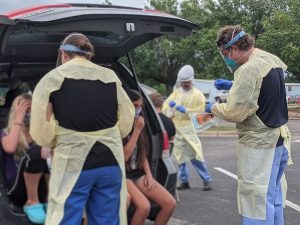At UNC Hospitals, patient care teams were seeing increasing numbers of Latinx COVID-19 patients from Lee and nearby Chatham counties. So a volunteer UNC team led by UNC’s division of infectious diseases has put in place drive-up testing in Sanford, in the center of Lee County, about 35 miles south of Chapel Hill.

It’s hot (especially wearing full PPE), it’s tedious, and it’s critical. A volunteer team of UNC infectious diseases faculty members along with UNC hospitalists has been conducting drive-up testing for COVID-19 in Sanford, NC, about 35 miles south of Chapel Hill, twice a month since June, seeing roughly 1,000 local residents so far this summer.
“After 11 hours of hard work, about 260 people were tested yesterday, and many I saw were symptomatic,” says David Alain Wohl, MD, professor of medicine, after the most recent day of testing on July 28. Wohl and Amir Barzin, DO, MS, of UNC Family Medicine led the design of the drive-up COVID-19 testing process first launched on UNC-Chapel Hill’s campus this past spring. Together with infectious diseases colleagues Michael Herce, MD, MPH, MSc, and Emily Ciccone, MD, MHS, and partnerships with the federally qualified Piedmont Health system and the Lee County Department of Health, Wohl is bringing testing to one of the areas of North Carolina hardest hit by the pandemic.
In UNC’s hospital, Wohl and his colleagues were seeing increasing numbers of Latinx patients coming from Lee and nearby Chatham counties with COVID-19. “Many of these people are essential workers in the meat-processing and agricultural industries,” he says. “These are our neighbors, but there was a testing desert in the area.” So, he reached out to North Carolina’s Department of Health and Human Services to ask for tests.
“The state DHHS lab has been terrific. We are partnering with them to do these tests at no cost and without burdening UNC Health,” Wohl notes. “We’re linking the positive tests to medical homes within Piedmont Health and to the county so they can then do contact tracing. And we’re working with community based organizations to spread the word in Spanish and increase the community’s acceptance of testing.” In addition to the drive-up testing, Wohl and Herce worked with the leadership at Chatham Hospital to help increase their COVID-19 testing capacity to meet the needs of the communities in and around Siler City, including those that are predominately Latinx.
At their first event, almost 300 people were tested and 115 tested positive. While the proportion of those testing positive has dropped since then, it remains relatively high. “This tells us we are at the right place, at the right time to do tests that link to the public health and clinical measures that we need to reduce the spread and human toll of this virus,” says Herce.
“Lee County is truly blessed to have such dedicated and wonderful partners in Piedmont Health and UNC Health,” says Heath Cain, Lee County health director. “Thanks for all you are doing to ensure the safety and well-being of our residents. It is greatly appreciated by so many here.”
The pop-up testing sites have included a downtown Sanford civic center parking lot where the team has worked in 100+ degrees heat index and rain storms. The all-volunteer team includes Wohl, Herce, and Barzin as well as UNC physicians Sally Wood, Rimma Osipov, and Gayle Thomas, who also do the swab tests. Supporting them is Karen Roque from UNC Health plus a crew of undergraduate students and even a few work-out buddies of Wohl’s who help on site to translate, help people fill out forms, hand out re-usable cloth masks, and direct traffic.
“It’s a ragtag and terrific team that shows up,” says Wohl, whose research has focused on HIV for over 20 years but more recently has included testing and treatment of Ebola and Lassa fever as those diseases emerged in Africa. “I feel we’ve been a glue that has put all these wonderful people together.”
Written by Lisa Watts, Communications Manager for the UNC Institute for Global Health and Infectious Diseases.